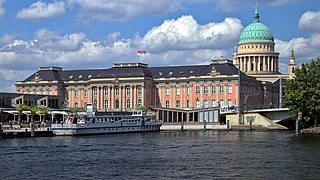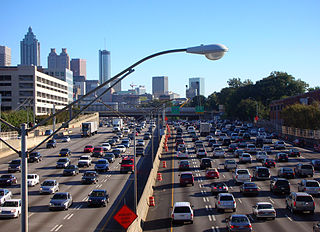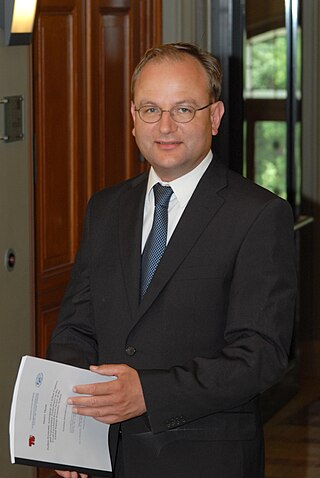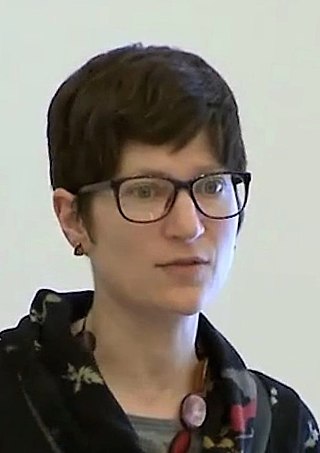Related Research Articles

Potsdam is the capital and, with around 183,000 inhabitants, largest city of the German state of Brandenburg. It is part of the Berlin/Brandenburg Metropolitan Region. Potsdam sits on the River Havel, a tributary of the Elbe, downstream of Berlin, and lies embedded in a hilly morainic landscape dotted with many lakes, around 20 of which are located within Potsdam's city limits. It lies some 25 kilometres southwest of Berlin's city centre. The name of the city and of many of its boroughs are of Slavic origin.

A carbon footprint is the total greenhouse gas (GHG) emissions caused by an individual, event, organization, service, place or product, expressed as carbon dioxide equivalent (CO2e). Greenhouse gases, including the carbon-containing gases carbon dioxide and methane, can be emitted through the burning of fossil fuels, land clearance, and the production and consumption of food, manufactured goods, materials, wood, roads, buildings, transportation and other services.
Anthropogenic metabolism, also referred to as metabolism of the anthroposphere, is a term used in industrial ecology, material flow analysis, and waste management to describe the material and energy turnover of human society. It emerges from the application of systems thinking to the industrial and other man-made activities and it is a central concept of sustainable development. In modern societies, the bulk of anthropogenic (man-made) material flows is related to one of the following activities: sanitation, transportation, habitation, and communication, which were "of little metabolic significance in prehistoric times". Global man-made stocks of steel in buildings, infrastructure, and vehicles, for example, amount to about 25 Gigatonnes, a figure that is surpassed only by construction materials such as concrete. Sustainable development is closely linked to the design of a sustainable anthropogenic metabolism, which will entail substantial changes in the energy and material turnover of the different human activities. Anthropogenic metabolism can be seen as synonymous to social or socioeconomic metabolism. It comprises both industrial metabolism and urban metabolism.

Greenhouse gas emissions from human activities strengthen the greenhouse effect, contributing to climate change. Most is carbon dioxide from burning fossil fuels: coal, oil, and natural gas. The largest emitters include coal in China and large oil and gas companies. Human-caused emissions have increased atmospheric carbon dioxide by about 50% over pre-industrial levels. The growing levels of emissions have varied, but have been consistent among all greenhouse gases (GHGs). Emissions in the 2010s averaged 56 billion tons a year, higher than any decade before. Each year, about 6.7 million people die from polluted air quality.

The United States produced 5.2 billion metric tons of carbon dioxide equivalent greenhouse gas (GHG) emissions in 2020, the second largest in the world after greenhouse gas emissions by China and among the countries with the highest greenhouse gas emissions per person. In 2019 China is estimated to have emitted 27% of world GHG, followed by the United States with 11%, then India with 6.6%. In total the United States has emitted a quarter of world GHG, more than any other country. Annual emissions are over 15 tons per person and, amongst the top eight emitters, is the highest country by greenhouse gas emissions per person. Because coal-fired power stations are gradually shutting down, in the 2010s emissions from electricity generation fell to second place behind transportation which is now the largest single source. In 2020, 27% of the GHG emissions of the United States were from transportation, 25% from electricity, 24% from industry, 13% from commercial and residential buildings and 11% from agriculture. These greenhouse gas emissions are contributing to climate change in the United States, as well as worldwide.

A global warming game, also known as a climate game or a climate change game, is a type of serious game. As a serious game, it attempts to simulate and explore real life issues to educate players through an interactive experience. The issues particular to a global warming video game are usually energy efficiency and the implementation of green technology as ways to reduce greenhouse gas emissions and thus counteract global warming. Global warming games include traditional board games, video games, and other varieties such as role-playing and simulation-assisted multiplayer games.

The Potsdam Institute for Climate Impact Research is a German government-funded research institute addressing crucial scientific questions in the fields of global change, climate impacts, and sustainable development. Ranked among the top environmental think tanks worldwide, it is one of the leading research institutions and part of a global network of scientific and academic institutions working on questions of global environmental change. It is a member of the Leibniz Association, whose institutions perform research on subjects of high relevance to society.
The Karl-Scheel-Preis is an award given annually by the Physikalische Gesellschaft zu Berlin, a regional association of the Deutsche Physikalische Gesellschaft, for outstanding scientific work. The prize was established through an endowment by the German physicist Karl Scheel and his wife Melida. Recipients are awarded with the Karl-Scheel Medal and 5.000 Euros. The Karl-Scheel Medal in bronze was designed by the German sculptor Richard Scheibe and has a diameter of 12 cm.

Hans Joachim "John" Schellnhuber is a German atmospheric physicist, climatologist and founding director of the Potsdam Institute for Climate Impact Research (PIK) and former chair of the German Advisory Council on Global Change (WBGU).

Ottmar Georg Edenhofer is a German economist who is regarded as one of the world's leading experts on climate change policy, environmental and energy policy, and energy economics. His work has been heavily cited. Edenhofer currently holds the professorship of the Economics of Climate Change at the Technical University of Berlin. Together with Earth scientist Johan Rockström, economist Ottmar Edenhofer is scientific director of the Potsdam Institute for Climate Impact Research (PIK), representing the interdisciplinary and solutions-oriented approach of the institute. Furthermore, he is director of the Mercator Research Institute on Global Commons and Climate Change (MCC). From 2008 to 2015 he served as one of the co-chairs of the Intergovernmental Panel on Climate Change (IPCC) Working Group III "Mitigation of Climate Change".

Individual action on climate change can include personal choices in many areas, such as diet, travel, household energy use, consumption of goods and services, and family size. Individuals can also engage in local and political advocacy around issues of climate change. People who wish to reduce their carbon footprint, can take "high-impact" actions, such as avoiding frequent flying and petrol fuelled cars, eating mainly a plant-based diet, having fewer children, using clothes and electrical products for longer, and electrifying homes. Avoiding meat and dairy foods has been called "the single biggest way" an individual can reduce their environmental impact. Excessive consumption is more to blame for climate change than population increase. High consumption lifestyles have a greater environmental impact, with the richest 10% of people emitting about half the total lifestyle emissions.

GAIA: Ecological Perspectives for Science and Society is a peer-reviewed academic journal established in 1992. Its main focus is on background information, analyses, and solutions of environmental and sustainability problems. Since 2001 it is published by oekom verlag. Articles are in English and German. The editor-in-chief is Helga Weisz . GAIA follows the Green Road to Open Access: Authors can archive their article for free public use on personal websites and/or in any open access repository immediately after publication . Authors retain copyright: All articles are published under the terms of the Creative Commons Attribution license CC BY 4.0. Additionally, GAIA offers GAIA Hybrid Option: With this option authors can publish their articles with full open access against a basic charge.

The Mercator Research Institute on Global Commons and Climate Change (MCC) conducts research and fosters dialogue about how the global commons, such as the atmosphere and the oceans, might be used and shared by many yet nevertheless be protected. In 2021, The International Center for Climate Governance ranks MCC among the top ten think tanks worldwide for the fourth consecutive year.
Marina Fischer-Kowalski is an Austrian sociologist and social ecologist and a professor emeritus of the University of Klagenfurt, currently teaching at the University of Natural Resources and Life Sciences, Vienna, the University of Klagenfurt and the University of Vienna. She is known for founding the Vienna School of Social Ecology and for her pioneering work on the widely used metric for material and energy flows to complement economic accounting. Fischer-Kowalski works on socio-environmental change, sustainable development and the Anthropocene.

Julia K. Steinberger is Professor of Ecological Economics at the University of Lausanne. She studies the relationships between the use of resources and performance of societies. She is an author of the Intergovernmental Panel on Climate Change (IPCC) 6th Assessment Report, contributing to the report's discussion of climate change mitigation pathways.

Sabine Kunst is a German engineer, academic and politician who has been serving as chairwoman of the Joachim Herz Foundation since 2022.
Kirsten Zickfeld is a German climate physicist who is now based in Canada. She is a member of the United Nations' Intergovernmental Panel on Climate Change, and was one of the authors on the Intergovernmental Panel on Climate Change's (IPCC) Special Report on Global Warming of 1.5 °C (SR15).Zickfeld completed a Master of Science degree in physics at the Free University of Berlin in 1998, followed by a doctorate in physics at the University of Potsdam in 2004.[7]
Brigitte Knopf is a German climatologist. Since February 2015 she has been Secretary General of the Mercator Research Institute on Global Commons and Climate Change and since 1 September 2020 has been a member of the Expert Council on Climate Issues.
Ricarda Winkelmann is a German mathematician, physicist, and climatologist. She is a professor of Climate System Analysis at Potsdam University and the Potsdam-Institute for Climate Impact Research. She studies interdependencies between climate, land ice, and the ocean.
Bettina Hörstrup is a German lawyer and administrative director of the Potsdam Institute for Climate Impact Research (PIK) since 2020. Together with the scientific directors Ottmar Edenhofer and Johan Rockström, she forms the board of the Potsdam Institute for Climate Impact Research.
References
- ↑ Weisz, Helga (2009-06-12). "Wenn alles bleiben soll, wie es ist, muss sich alles ändernIf We Want Things to Stay as They Are, Things Will Have to Change". GAIA - Ecological Perspectives for Science and Society. 18 (2): 104–106. doi:10.14512/gaia.18.2.5.
- ↑ "Prof. Dr. Helga Weisz". Institut für Kulturwissenschaft. Humboldt-Universität zu Berlin. Retrieved 2021-04-07.
{{cite web}}: CS1 maint: url-status (link) - ↑ "Social Metabolism & Impacts — Potsdam Institute for Climate Impact Research". www.pik-potsdam.de. Retrieved 2021-04-07.
- 1 2 3 "Academic background — Potsdam Institute for Climate Impact Research". www.pik-potsdam.de. Retrieved 2021-04-07.
- 1 2 "Past Positions — Potsdam Institute for Climate Impact Research". www.pik-potsdam.de. Retrieved 2021-04-07.
- ↑ "Weisz — Potsdam Institute for Climate Impact Research". www.pik-potsdam.de. Retrieved 2021-04-07.
- ↑ NACHRICHTEN, n-tv. "Lokaler Klimaschutz wirkt global". n-tv.de (in German). Retrieved 2021-04-07.
- ↑ "Weltweit müssen Städte ermutigt und befähigt werden, ihr gesamtes Emissionsspektrum – lokale und vorgelagerte Emissionen – zu beobachten. Erst dadurch können die notwendigen und ambitionierten Pläne vieler Städte zur Einhaltung der 2-Grad-Grenze verwirklicht werden."